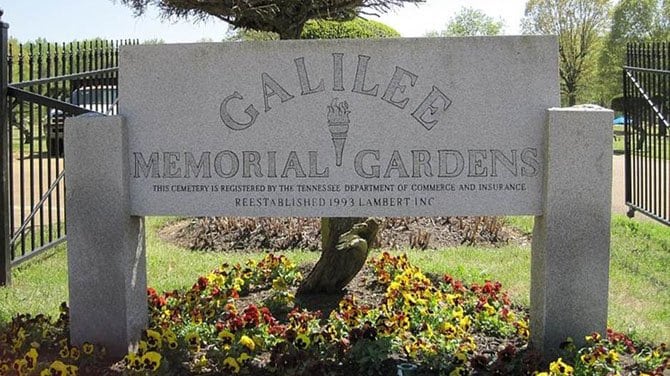By ADRIAN SAINZ, Associated Press
MEMPHIS, Tenn. (AP) — Licensed funeral homes had no responsibility to know that the Tennessee cemetery where they were sending corpses to be interred was grossly mishandling burials even after it lost its registration, a lawyer said Tuesday.
John Branson delivered an opening statement in the trial in a lawsuit accusing more than a dozen funeral homes of knowingly sending bodies to Galilee Memorial Gardens to be buried for three years after its registration expired in December 2010. More than 1,200 families claim the Memphis-area funeral homes failed to carry out their “sacred and contractual duties” for relatives who expected their loved ones to be laid to rest with respect.
Investigations have revealed that the cemetery’s owners, the Lambert family, misplaced hundreds of bodies, buried multiple cadavers in the same grave, and crushed caskets to fit them into single plots for years. Many people can’t find their relatives’ graves.
The funeral homes kept sending bodies to Galilee until the cemetery was closed in 2014, says the lawsuit, which seeks damages expected to be in the millions of dollars if the jury finds for the families. Mishandling of remains would not have occurred if licensed funeral directors had supervised burials until the bodies were in the ground, said Kathryn Barnett, a lawyer for the families.
Located in the Memphis suburb of Bartlett, the cemetery remains closed. It has been under receivership for four years. Jemar Lambert, who took over the cemetery’s operations after his father died, received 10 years’ probation in a plea deal with prosecutors for his role in the mishandling of burials.
Speaking for the funeral homes, Branson told a jury that funeral directors who oversaw services did not choose the cemetery where the bodies were sent — the families did. Branson said the directors were not required to be present at burials.
State regulators are responsible for oversight of cemeteries, not funeral directors, Branson said. He noted that the state Department of Commerce and Insurance allowed burials at Galilee even after its registration lapsed, and while the department was receiving repeated complaints of lost bodies.
“The case is not about what happened at the funeral homes,” Branson said. “The case is about what happened at Galilee cemetery.”
In her opening statement, Barnett said Galilee would hold a brief service with the body resting on an above-ground stand under a temporary tent or canopy. Galilee would then tell relatives that the body would be buried later on, and ask them to leave. The funeral directors would also depart before the burial was completed, Barnett said.
“This was set up like a McDonald’s drive-thru,” Barnett said.
People who have not been able to find their relatives’ graves at Galilee have told The Associated Press that they agreed to leave hurriedly before the burials because they were emotionally spent and they trusted the cemetery to handle the process properly.
Bodies were buried in walkways, in drainage areas, and on grounds not belonging to the cemetery, Barnett said.
“The funeral director walked away, turned his back and left these remains in a place of utter disrespect and desecration,” Barnett said.
More than 100 relatives of people who are buried at Galilee were in the courtroom. Some dabbed at their eyes with tissues as Barnett spoke.
Experts say the case has exposed a lack of regulation and detailed state oversight of privately-owned cemeteries and funeral homes nationwide.




